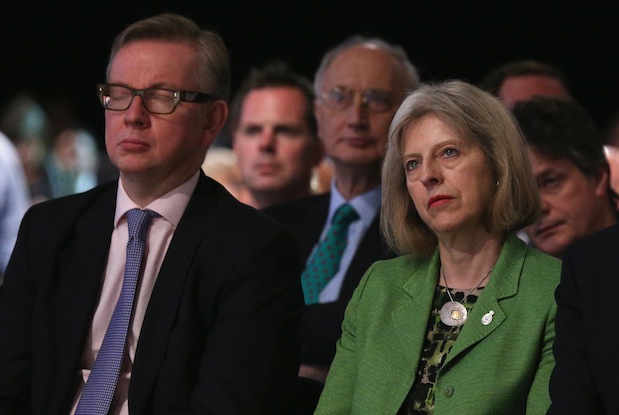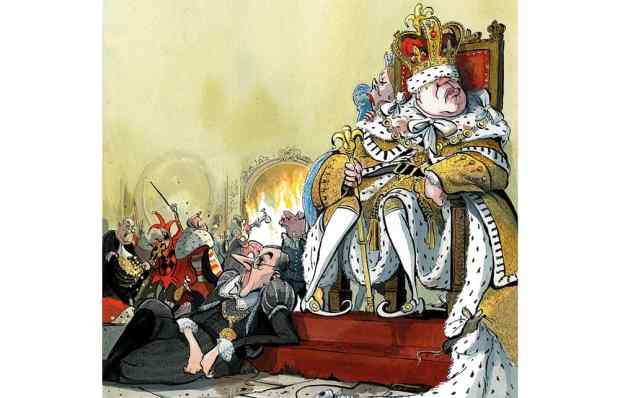Listen
Modern Conservatives seem to be allergic to success. Every time things are going right, the party spasms. Sir John Major’s government nurtured a remarkable economic recovery, yet was beaten after its infighting appalled voters. In opposition, David Cameron acquired a habit of blowing opinion poll leads — a habit he did not, alas, shake off in time for the general election. And now, just as a Conservative victory at the next election looks likely, the party has decided to lose its head again.
The feuding between Michael Gove and Theresa May is, in part, a problem of success. Gove has proven to be a radical, reforming Education Secretary; he has arguably achieved more than anyone else in government. Ms May can claim to be the most consequential Home Secretary in modern times: she has taken controllable immigration (i.e., from outside Europe) to its lowest level in 16 years and recorded crime to its lowest in 25 years, and all on a budget that’s the lowest it has been in ten years. Her recent confrontation with the Police Federation showed her at the height of her powers.
Both ministers like to fight, and both like to win. But they now seem to be fighting each other. Mr Gove’s views on Islamism are well known: he once wrote a book, Celsius 7/7, against the appeasement of fundamentalists. Ms May’s determination is also legendary: she likes to work until 2 a.m. identifying and eliminating problems (and enemies). The deportation of Abu Qatada was her most high-profile success. But she tends to regard any interference with her department as an act of aggression — even on relatively innocent issues such as Chinese visas, which was of concern to the Treasury.
The issue of Islamism in Birmingham schools has set Gove and May against each other again. Mr Gove has no confidence in Charles Farr, Ms May’s counter-terrorism chief (and, to complicate matters, the partner of her special adviser). One of Mr Gove’s aides has been quoted saying that Mr Farr is focusing on thwacking crocodiles when he should be draining the swamp. Ms May, for her part, wrote a letter asking why Gove did not act when his department was first warned about Islamism in West Midlands council-run schools four years ago. Magically, May’s letter found its way to the press.
The Education Department and the Home Office are behaving like autonomous government agencies, and it’s easy to see why. Under Cameron, No. 10 has become a coalition reconciliation service, rather than a centre of government. Cameron’s aides act as regularly for Nick Clegg as for the Prime Minister himself. Cameron does not attempt to dictate government from the centre. This is to his credit. But he has spent (and wasted) so much time keeping Liberal Democrats happy that he has neglected his own party.
The Conservatives intend to fight the next election by parading their competence — which will be difficult enough, especially when it comes to issues like government finances. But more Tory feuding may fatally undermine Cameron’s claim to be the most stable force in British politics.
That two powerful cabinet members could be at war with each other, dripping poisonous quotes to the press on the day of the Queen’s Speech, reveals an appalling lack of discipline. More importantly, it exposes a lack of prime ministerial grip. This has put the Conservatives out of power before, and may do so again.
Long may she reign
It would be easy to look at the alluring photographs of Prince Felipe of Spain and his young family sitting on their garden bench and wonder whether the United Kingdom should join the current fad for abdication among European royals. With a little nudge from her advisers in grey suits, might our own Queen bow out to a graceful retirement and make way for her son, or better still her grandson, and the monarchy become the living embodiment of what Tony Blair used to like to call — when he was still in his early forties — a ‘young country’?
It is something strongly to be resisted. For all the skill of Prince Felipe’s PR agents, the best advert for monarchy this week is the sight of the Queen making the short journey from Buckingham Palace to the House of Lords to speak at the state opening of Parliament.
Here, in one dignified octogenarian, is encapsulated the advantage of monarchy over republic. The country has been led by 12 prime ministers since the Queen began her annual (or mostly annual) visit to Westminster. The Commons has been cleared out by 15 general elections, many of them angry and divisive affairs. Yet the head of state has remained constant throughout. She is a humble reminder to our here-today, gone-tomorrow politicians that they are not bigger than the British state.
The stability of our political system also brings with it a huge dividend the worth of which no one has yet thought to calculate. It attracts both money and talent. The Queen is a large part of that stability, and to bring the second Elizabethan age to a premature close would be a folly.
Got something to add? Join the discussion and comment below.
Get 10 issues for just $10
Subscribe to The Spectator Australia today for the next 10 magazine issues, plus full online access, for just $10.
You might disagree with half of it, but you’ll enjoy reading all of it. Try your first month for free, then just $2 a week for the remainder of your first year.














Comments
Don't miss out
Join the conversation with other Spectator Australia readers. Subscribe to leave a comment.
SUBSCRIBEAlready a subscriber? Log in